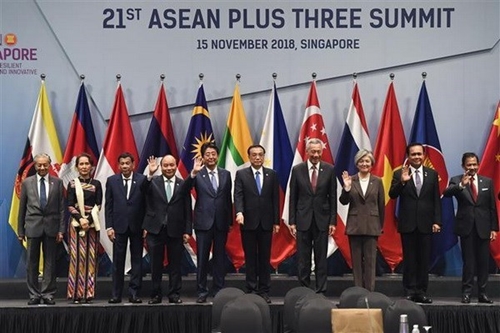December 15, 2018 | 20:16 (GMT+7)
ASEAN Plus 3 revises agreement protecting regional finance
The Association of Southeast Asian Nations (ASEAN) and their partners, namely China, Japan, and the Republic of Korea (RoK) agreed on December 14 to revise the Chiang Mai Initiative Multilateralization (CMIM) Agreement – a regional financial safety net.
According to the RoK’s Ministry of Economy and Finance, the decision was made by deputy finance ministers and the deputy governors of the central banks of ASEAN Plus 3 countries at a meeting to discuss key regional issues in Busan.
Previously, at a meeting in May in Manila, the Philippines, the finance ministers and central bank governors of these countries reached a consensus on stepping up the implementation of the CMIM, intensifying financial cooperation, and supporting multilateral trade and investment systems.
    |
 |
|
Leaders of ASEAN countries and China, Japan and the Republic of Korea posed for a photo at the 21st ASEAN Plus Three Summit in Singapore last November. |
They also agreed to build a new comprehensive legal basis to create favorable conditions for the CMIM to support member states in addressing risks through policy recommendations and financial assistance.
The USD-120-billion CMIM, which took effect in 2010, is a multilateral currency swap contract between ASEAN Plus 3 countries to increase their response to rising risks and fluctuations in the global economy.
CMIM provides financial support through currency swap transactions to its participants facing difficulties in the balance of payments and short-term liquidity.
Source: VNA